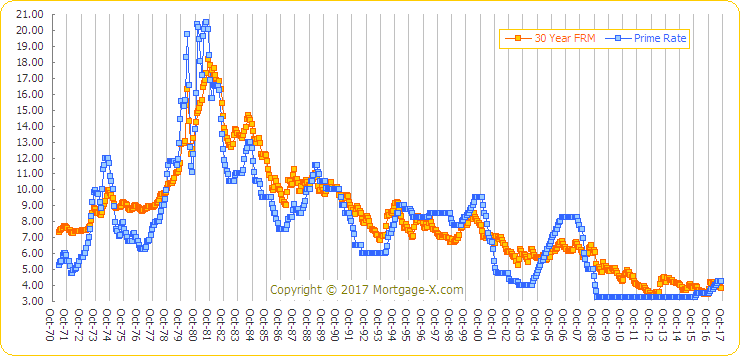There are three main reasons that now is such a prime (maybe an ever better) opportunity to buy a home in Chicago.
- Inventory is very high. There are so many homes to choose from. If you cannot find a home that suits your style and fits your budget in the current environment, you need to determine if you're being realistic in your search.
- Homes have continued to hold their value, but prices have not grown as quickly as they have historically.
- Interest rates are still incredibly low, within a point or so of their 40-year low for a 30 year fixed mortgage.
As it relates to home values, the Illinois Association of Realtors reports that
According to IAR’s latest report, the Illinois median home sale price in September was $200,000, up 0.8 percent from $198,500 in September 2006. The statewide average home sale price in September was $264,749, up 4.6 percent from $253,139 a year ago. There were 10,476 total home sales in September 2007, 22.9 percent below September 2006 which logged 13,594 home sales. Year-to-date, sales were down 15.4 percent to 112,278 homes sold January through September 2007 compared to 132,784 homes sold during the same period last year.
“Most Illinois homeowners are experiencing very healthy long-term gains in the value of their homes, and real estate remains the single best investment over the long term providing wealth accumulation especially for those who keep the home for a typical holding period of six to 10 years,” said REALTOR Kay Wirth, president of the Illinois Association of REALTORS. “Market basics are solid and with low mortgage interest rates, strong household formation and job creation—moving forward these factors should bode well for a recovery in the housing economy.”
Despite poor housing news on the National headlines, home prices in the same key 5 neighborhoods have continued to rise modestly in that time by just over 6% (~3% annually)! That means you are buying in a period of modest growth (as opposed to rapid), without fear that you could have paid less for a comparable home in the future, and with confidence that the value of your investment is appreciating.
Finally, we come to interest rates. The national news has reported loudly on the demise of the mortgage industry due to the Subprime Mortgage "crisis". "Not so fast my friend," as a popular sportscaster likes to say, while this has had an impact on the national housing market and could impact many prospective home buyer's ability to get a mortgage, it doesn't have to affect you.
I have seen no issues (correct - none) with qualified home buyers getting a pre-approval for a mortgage. Gone are the days when a borrower with less than stellar credit can get 100% financing with no documentation - and for good reason. However, if you can make a strong down payment 10-20%, or have strong credit, or have a good income and a low debt to income ratio, (at least some combination therein) you will be able to find a good loan deal with a reputable lender. It is more important than ever to work with an experienced lender that closes a majority of their deals in your locality (read: does business predominantly in Chicago). If you don't have a trusted lender, your licensed Realtor can certainly recommend two or more who have done a good job for their clients in the past.
Mortgage rates are currently incredibly low. In the last 40 years, we've seen them bottom out about 1 point below their current price. What's more, 30 year fixed rates are sitting a couple points below the current prime rate. That is a historical rarity rivaled by solar eclipses.
Reprinted with permission
Have you heard the expression "buy low and sell high"? If you've read my blog you have. Actually, if you haven't been living in a cave you have...
Your purchase will put a roof over your head and a place to keep your stuff. It will give you many years of enjoyment. It should also appreciate in value over time.
If you want to buy low - now is the time. The price of homes is relatively low (and I don't see them declining) and the price of money (i.e. mortgage rates) is historically very low. There's plenty to choose from, so you are in the driver's seat.
If you have a home to sell, you may be thinking that the "buy low, sell high" is working against you. On the contrary, if you are moving up, buying a more valuable home, you should sell your old home now (for less) in order to get the great value home now, while prices are high. Its like selling 100 shares of a lower priced stock to buy 200 shares of a more valuable stock right before the market takes off.






